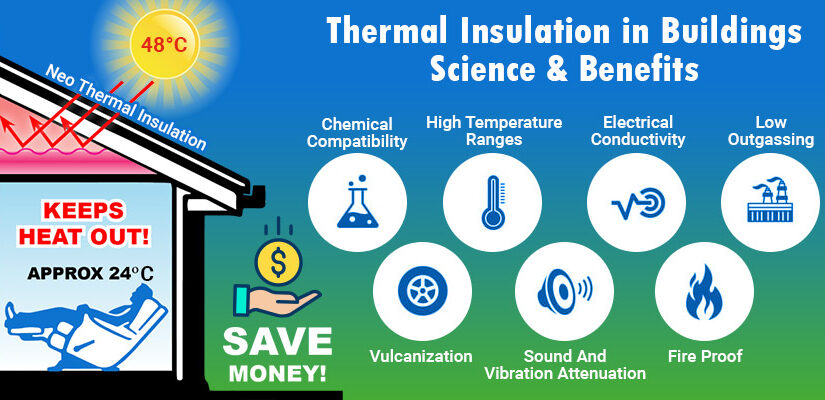What Are The Architectural Elements That Enhance Thermal Insulation In Buildings?

As winter sets in across the country, many people are turning up their thermostats in an attempt to stay warm. However, without proper insulation in your home or building, you may find yourself feeling the chill no matter how high you push that thermostat.
Thermal insulation is an essential component of any home or building. Without it, heat can easily escape through walls, windows, and roofs, leaving you feeling the cold and wasting energy. Here are just a few reasons why thermal insulation is so important:
Reduced Energy Bills
One of the most significant benefits of thermal insulation is the potential for reduced energy bills. When your home or building is properly insulated, heat is trapped inside, making it easier for your heating system to maintain a comfortable temperature.
Without proper insulation, heat can easily escape through walls and windows, leading to energy wastage and higher bills.
Increased Comfort
Another benefit of thermal insulation is increased comfort. Having insulation in your home or building can help to maintain a more consistent temperature, reducing fluctuations and making it more comfortable to be inside.
Insulation can also help to reduce noise levels, making your home or building more peaceful and relaxing.
Improved Health
Thermal insulation can also lead to improved health, particularly for those with respiratory issues like asthma or allergies. Without proper insulation, moisture can easily build up inside walls and other areas, leading to the growth of mold and mildew.
These spores can be harmful to those with respiratory issues, leading to breathing difficulties and other health problems. By investing in proper insulation, you can help to reduce the risk of mold and mildew growth and improve indoor air quality.
Reduced Carbon Footprint
Another benefit of thermal insulation is that it can help you to reduce your carbon footprint. By reducing the amount of energy needed to heat your home or building, you can help to conserve energy and reduce greenhouse gas emissions.
Not only is this better for the environment, but it can also help you to reduce your energy bills and save money over time.
Increased Property Value
Investing in thermal insulation can also help to increase the value of your property. Buyers are increasingly looking for homes that are energy-efficient and eco-friendly, and having proper insulation can help to make your property more attractive to potential buyers.
Extended Building Lifespan
Finally, thermal insulation can help to extend the lifespan of your building. Without proper insulation, fluctuating temperatures and moisture build-up can lead to structural damage over time.
By investing in high-quality insulation, you can help to protect your building and ensure that it lasts for decades to come.
FAQ
What types of thermal insulation are available?
There are several types of thermal insulation available, including batt insulation, blown-in insulation, foam board insulation, and spray foam insulation. The type of insulation that is best for your home or building will depend on a variety of factors, including your budget, the climate in your area, and the age and condition of your building.
How long does thermal insulation last?
The lifespan of thermal insulation can vary depending on the type of insulation and the conditions in your home or building. However, most types of insulation are designed to last for many years, with some lasting up to 50 or 60 years.
Is thermal insulation expensive?
The cost of thermal insulation will depend on a variety of factors, including the size of your home or building, the type of insulation you choose, and the complexity of the installation process. However, in many cases, the cost of insulation is offset by the long-term energy savings that it can provide.
Do I need a professional to install thermal insulation?
While it is possible to install some types of insulation yourself, it is generally best to hire a professional to ensure that the insulation is properly installed and will provide the maximum benefit. A professional insulation contractor will have the knowledge and experience to recommend the best type of insulation for your home or building and to ensure that it is installed correctly.
Conclusion
Whether you are looking to reduce your energy bills, improve the comfort of your home or building, or protect the environment, thermal insulation is an essential component of any home or building. By investing in high-quality insulation, you can enjoy a range of benefits, from reduced energy bills to improved health and increased property value.



Post a Comment for "What Are The Architectural Elements That Enhance Thermal Insulation In Buildings?"